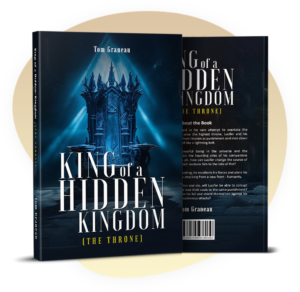Lucifer’s fall from Heaven is one of the most significant events in Christian theology, marking the birth of rebellion and the creation of Hell. In King of a Hidden Kingdom: THE THRONE by Tom Graneau, Lucifer’s decision to rise against God is portrayed as a tragic but deliberate act of defiance. But was this fall inevitable? Or did Lucifer truly have the freedom to choose another path?
This debate brings us to a fundamental theological question: If God is all-knowing, did He already foresee Lucifer’s rebellion? And if so, did Lucifer ever really have free will?

The Argument for Free Will
One of the key themes in King of a Hidden Kingdom is Lucifer’s agency. He is not forced into rebellion; rather, he chooses it. He allows his pride and ambition to overtake his devotion, convincing himself that he deserves more than what he has been given. He rallies other angels, not through coercion but through persuasion.
This suggests that Lucifer, like all created beings, had free will. God did not create him as an automaton programmed for obedience. Instead, He endowed Lucifer with intelligence, beauty, and autonomy. The tragedy of his fall is not that he was doomed from the start, but that he exercised his freedom in a way that led to ruin.
The Role of Divine Foreknowledge
However, if God is omniscient, then He must have known that Lucifer would betray Him before it even happened. This raises an apparent paradox—if God foresaw Lucifer’s fall, did Lucifer ever truly have a choice?
One way to resolve this paradox is to distinguish between knowledge and causation. Just because God knows something will happen does not mean He causes it. For example, a teacher might know that a student who never studies will fail an exam, but the teacher’s knowledge does not force the student to fail. Similarly, God’s foreknowledge of Lucifer’s rebellion does not remove Lucifer’s agency—it simply means that God, existing outside of time, has already seen the outcome of Lucifer’s choices.
Could Lucifer Have Repented?
Another crucial question is whether Lucifer had the option to repent. In King of a Hidden Kingdom, Lucifer’s immediate reaction to his exile is not sorrow, but rage. Even after witnessing the full extent of God’s power, he refuses to seek forgiveness. Instead, he doubles down on his rebellion, vowing to corrupt humanity as a means of revenge.
This suggests that even after his fall, Lucifer still had free will. He could have acknowledged his mistake and sought mercy. But his pride would not allow it. He chose to embrace his role as the adversary, ensuring that his suffering would be eternal.
The Nature of Inevitable Choices
Some might argue that Lucifer’s pride made his fall inevitable. If his nature was such that he could not accept being anything less than supreme, then perhaps there was never a real possibility of him choosing obedience.
However, inevitability does not necessarily negate choice. Many humans make self-destructive decisions not because they lack free will, but because their own desires cloud their judgment. Lucifer’s downfall was not imposed upon him—it was the natural result of his own unchecked ambition.
A Choice with Consequences
Ultimately, King of a Hidden Kingdom presents Lucifer’s rebellion as a choice—one that was foreseen but not forced. His story is not one of predestination but of self-inflicted ruin. He was given power, beauty, and freedom, but he used them to rebel. His exile was not the result of an unfair fate, but of his own unwillingness to accept divine order.
Did Lucifer have a choice? Yes. But once he made it, he had to live with the consequences. His greatest tragedy is not that he was destined to fall, but that even after falling, he refused to rise again.